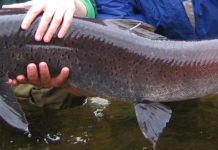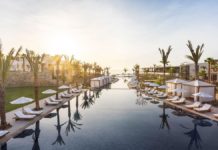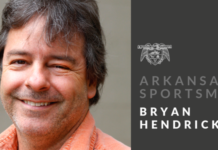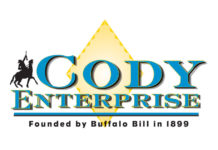As owners of a fly-fishing guide service on the Deschutes River, we have the rare opportunity to interact with the river, her fish and landscapes nearly every day. As Indigenous people whose ancestors fished many of the same waters, we understand the critical role we have as advocates. We stand up not only for the people of our area and for the Deschutes, but for the Columbia River and all of her tributaries that sustain us now, as they have since time immemorial. For some people, “water is life” is a slogan. For us it’s who we are. It’s in our DNA. As tribal members, citizens and fishing guides, we consider it our privilege and our duty to share our truth with others any way we can.
We are descendants of the Wasco Tribe of the Confederated Tribes of Warm Springs, and as far as we know, the only husband-wife Indigenous guide service in the country. Being on the river as much as we are, we see firsthand and in real time the changes happening in the river and to so many of our tribe’s traditions and first foods. Over the years we’ve become directly involved in change ourselves — we share parts of our story with every client we take out fishing. Protecting the river is one way we can give back to her and honor those who came before us — it’s something our people have been doing naturally for thousands of years.
Becoming an advocate is a journey, and not always easy. What we’ve learned is that once we have found our voice, the first key is growing thick skin and standing up for what is morally right. The second key is collaborating with leaders who share our commitment to our rivers and the determination to protect them. Over the years we’ve stood up to major industries — and we’ve won — for the river. When we’ve been most successful is when we’ve stayed strong to our commitments and joined forces with leadership and decision-makers like Gov. Kate Brown, our local state representatives and others unafraid to stand with us.
Collaboration among advocates, conservationists and courageous leaders willing to help heal and defend the Columbia River and her tributaries is needed now more than ever if we want to save what we have left. When the construction of the The Dalles dam drowned Celilo Falls in 1957, we lost in an instant a sacred place Indigenous people had fished since time immemorial. The four lower Snake River dams were built in the following decades and have created a system that has pushed our salmon to the brink and is run by federal agencies that continue to fail us.
But we can heal our rivers, restore our salmon and take care of one another. Will it be hard? Yes. Is it worth it? Absolutely. It requires every one of us, coming together in bold action, as Gov. Brown has. Removing the dams on the lower Snake River won’t bring Celilo back, but it will help restore Columbia and Snake river salmon and steelhead. It’s a necessary step in our journey to heal.
As Indigenous people, citizens and guides, we’re speaking for the river and all she provides us because it’s what we’re supposed to do. It’s who we are. We seek out and support leadership that stands with us. It should be what they’re supposed to do, too.
Alysia and Elke Littleleaf are owners of Littleleaf Guide Service in Warm Springs.
Credit: Source link































